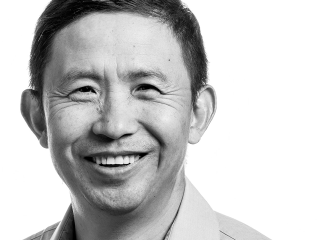
Ming Wu, PhD
Associate Professor of Bioengineering, UIC
Adjunct Associate Professor of Physical Medicine and Rehabilitation, NU
My Lab
Laboratory of Engineering for Gait Science (LEGs)
We study the underlying neuralplasticity mechanisms of improved walking function after robotic-assisted locomotor training for patients with neurological injury.
view labAbout Me
Dr. Ming Wu is a Research Scientist of the SRAlab, an Associate Professor of the Department of Bioengineering of UIC, and adjunct Associate Professor of the Department of Physical Medicine and Rehabilitation, NU. His research interest has been focusing on improving walking function and balance of patients post stroke, spinal cord injury, and children with cerebral palsy using robotic intervention. He has collaborated with clinical physicians at SRAlab and is currently working on his three NIH funded RO1 projects.
Location
Shirley Ryan AbilityLab
355 East Erie
Chicago, IL 60611
Education & Training
-
Education
1985 – 1989
Mechanical Engineering (Hydraulic Machine), Gansu University of Technology, China
1993 – 1996
Mechanical Engineering (Rehabilitation Engineering), Tsinghua University, Beijing, China
1999 – 2003
Mechanical Engineering (Human Biodynamic), Tsinghua University, Beijing, China
-
Fellowship
2003 – 2006
Biomedical Engineering, Rehabilitation Institute of Chicago
Featured Research
Recent Publications
Honors & Awards
-
Sarah Baskin Award for Excellence in ResearchRehabilitation Institute of Chicago, 2011
-
Switzer Distinguished Research FellowshipNIDRR, 2005
-
Individual Post-Doctoral FellowshipParalyzed Veteran of America, 2005
-
Sarah Baskin Award for Excellence in ResearchRehabilitation Institute of Chicago, 2005
-
Sarah Baskin Award for Excellence in ResearchRehabilitation Institute of Chicago, 2006
-
First class scholarship of Tsinghua UniversityTsinghua University, 2002
-
Best Paper AwardChinese Association of Rehabilitation Engineering, 2001
-
Excellent Student Award of Beijing CityBeijing City, 2001
-
12.9 Assistant Award of Tsinghua UniversityTsinghua University, 2001
-
First class scholarship of Tsinghua UniversityTsinghua University, 2000
Professional Affiliations
-
MemberSociety of Neuroscience, 2004
-
MemberAmerican Society of Biomechanics, 2004
-
MemberChinese Association of Rehabilitation Medicine, 2001
Research Interests
-
Neuromodulation for lower limb recovery after stroke, spinal cord injury, and with cerebral palsy
-
Development of novel robotic gait training systems and paradigms
Grants
-
Neuromuscular mechanisms of specific trunk interventions in children with cerebral palsyNIH/NINDS, 1R01NS115487, 2020 - 2025
-
Improve dynamic lateral balance of humans with SCINIH/NICHD, R01HD083314
, 2016 - 2021 -
Constraint induced movement therapy for walking in individuals post strokeNIH/NICHD, R01HD082216 , 2015 - 2020
-
Robotic pelvis manipulation improves dynamic balance and walking in children with cerebral palsyCerebral Palsy International Research Foundation, R-812-13 , 2013 - 2015
-
Robotic Gait Training Improves Locomotor Function in Children with Cerebral PalsyNIH/NICHD, R21HD066261, 2011 - 2013
-
Locomotor Adaptation in Individuals Post-StrokeNIH/NICHD, R21HD058267, 2009 - 2012
-
Enhanced locomotor recovery in human SCI through motor adaptationThe Craig H. Neilsen Foundation, #124890, 2009 - 2012
-
Locomotor adaptation in human spinal cord injury2552, Paralyzed Veteran of American Research Foundation, 2008 - 2010
-
Improved Locomotion in Human SCI through Altered Afferents FeedbackParalyzed Veteran of American Research Foundation, 2447, 2006 - 2008
-
Improved Locomotion of Human SCI through Sartorius AfferentsNIDRR, H133F050031, 2005 - 2006